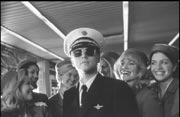At 16, the kid was a smoldering nobody picked on by school bullies. But he had the kind of cocky charm you can take to the bank, an unstoppable talent for impersonating people utterly unlike himself, and an uncanny ability to meet someone and walk off with millions—which he spent on high living, I-got-away-with-it bacchanalia, and all the squeeze- toy girls he could carry. That’s why Leonardo DiCaprio was a natural to play Frank Abagnale Jr. in Catch Me If You Can (opens Christmas Day at the Meridian and other theaters).
Ten years after his first high-school role, DiCaprio can still con us into believing he’s a high-school kid—one capable, in turn, of conning his classmates into believing he’s their substitute French teacher. He’s so convincing as an authority figure, he decides to skip school and take his con-man act on the road. In the 1960s, between the ages of 16 and 21, the real-life Abagnale cashed about $2.5 million in bad checks (that’s over $12 million in today’s dollars) in 26 countries, while posing as a Pan Am pilot, an assistant district attorney, a pediatrician, a sociology professor, and a stockbroker. They called him the Skywayman.
Rousing themselves from the glum netherworlds of A.I. and Minority Report, megadirector Steven Spielberg and ber-shooter Janusz Kaminski match their pace and palette to John Williams’ finger-snappin’ score—a pastiche of his old boss Henry Mancini, studded with upbeat classics. “Come fly with me!” urges Sinatra, and we’re off, giddily aloft on Young Indy Jones chase scenes, E.T. sentiment, Peter Pan panache, and kandy-kolored ’60s kitsch. Spielberg clearly feels liberated—he never really had his heart in all that existential angst, he was just doing it for extra credit, to up his grade in Gravitas 101 and get elected Hollywood class president. In all his movies, he’s got to identify with someone—Direktor Schindler, dino-entrepreneur Hammond—and the former teen who snuck onto the Universal lot and scammed his way into directing clearly had no trouble identifying with Abagnale.
After Frank brilliantly teaches French class for a few weeks, his fraud is exposed, and his parents (Nathalie Baye and Christopher Walken) have to come bail him out of the principal’s office. They’re remarkably understanding. After all, he’s only following in their footsteps: She’s an uppity, affair-prone Frenchwoman, and Frank Sr. is a small-time swindler with dreams beyond his ham-fisted grasp. Baye has style, and Walken proves he can do more than psychos: As a lovingly destructive dad, he scores.
Early in the film, after Frank Sr. teaches his son some con-man techniques, ࠬa Paper Moon, Frank Jr.’s mother runs off with another man. This makes Frank Jr. run away and find himself—that is, his many selves. Spielberg’s light touch is perfect for making each scam lifelike, letting us in on Frank’s dizzying sense of self-discovery. DiCaprio is nonpareil at distracting a teller from a bogus check by dazzling her with an out-of-the-blue fancy dinner invitation (he wasn’t womanizing all those years; he was researching a role). In Frank’s faux-physician phase, he charms a candy striper (Amy Adams) right out of her stripes. Adams is adorable as an untouched sundae, and Martin Sheen is Martin Sheen-like as her stern daddy.
NO SENSE SPOILING the delightful spontaneity of his diverse impersonations, but note how sweet it all looks, bathed in that patented Spielberg light. For the most part, Frank Jr.’s crimes seem victimless, inconsequential. However, a certain predictability creeps into his high jinks and comeuppance (despite at least one hairbreadth escape that’s too good to be true, but is in fact true). I think that’s why it took 22 years for Frank’s memoir to become a movie. Screenwriter Jeff Nathanson tries to up the emotional ante by structuring the story as Frank Jr.’s race into the arms of Frank Sr.’s replacement: Hanratty (Tom Hanks), the indefatigable FBI agent who catches wise to Frank’s scam and vows to hunt him down. The rest of the world, including the FBI, doesn’t get Frank: Only Hanratty is on his high-IQ wavelength. They’re made for each other.
If Hanks isn’t careful, he’s going to get typecast as The Surrogate Father—can he ever pry that damn fedora off his scalp? But he’s sure good at fatherhood: a stately grump with a growing affection for the rapscallion scamp who eludes him. In the film’s running gag, Frank Jr. always calls him on Christmas, and pretty soon Hanratty emotionally deduces why: Frank Jr. doesn’t have anyone else to call. As the movie tells it, Frank Jr. is only bad because he lacks a good daddy to tell him to stop. It’s the same saccharine setup Spielberg is notorious for—only, like the heroism of Schindler, it appears to be outrageously sweet and historically accurate.
The capers caper ably, the heartstrings pluck with jazzy precision, and Spielberg crafts a dandy entertainment. Still, it’s best enjoyed if you keep your expectations modest. The previews exaggerate the film’s period brio; there’s way more infectious ’60s ebullience in Austin Powers than this more earthbound romp. The party scenes (“Come quick, Lance just fell into the conversation pit!”) are flat. There aren’t nearly enough exquisite lyrical bits that match the ineffable scene, as Hanratty is about to turn a doorknob and nab Frank, where a dollar floats up at Hanratty from under the doorway and pirouettes past him like a symbol of his prey—and of his prey’s pipe dreams. Too many scenes generate admirable momentum, then stop, forcing the next scene to generate its own head of soon-to-dissipate steam.
Still, a Spielberg trifle beats most directors’ magnum opuses. Catch it if you can.









